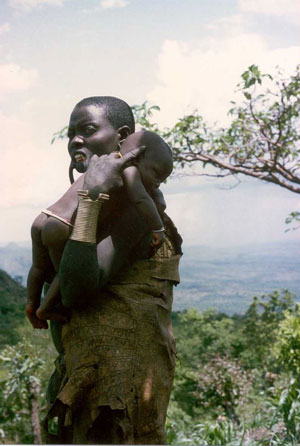New article by Jon Abbink: Menstrual synchrony claims among Suri girls (Southwest Ethiopia): between culture and biology
 ASC researcher Jon Abbink published a new article in Cahiers d’Études Africaines in the field of sexual and reproductive rights. Among the Suri agro-pastoralists, a relatively self-sufficient and independent people of ca. 34,000 in the extreme southwest of Ethiopia, young adolescent girls often assert that they menstruate together and regulate their own menstrual cycle, relating it to the phases of the moon. “Menstrual synchrony” is a much debated and still unresolved phenomenon in the scientific literature. Rather than giving immediate credence to its existence, Abbink claims that the young, unmarried Suri girls - well aware of all biological facts around procreation, the fertility cycle and pregnancy prevention - follow a cultural script of sexuality and aim to fit physiological facts into a preferred socio-cultural mould. They use the synchrony assertion to change behaviour and thereby to maintain sexual independence and choice of partners in a society that is marked by significant gender equality but also by individual competition. After a brief presentation of key issues in the (inter-disciplinary) debate on menstrual synchrony and its possible existence and causes, Abbink describes Suri sexual culture and menstrual customs, using field data gathered in two villages. He then tentatively assesses the plausibility of the Suri girls’ claims to menstrual synchrony, and elaborates an interpretation of Suri female sexual/reproductive strategies as enhancing women’s agency in a society marred by growing internal instability, conflict, and an uncertain future.
ASC researcher Jon Abbink published a new article in Cahiers d’Études Africaines in the field of sexual and reproductive rights. Among the Suri agro-pastoralists, a relatively self-sufficient and independent people of ca. 34,000 in the extreme southwest of Ethiopia, young adolescent girls often assert that they menstruate together and regulate their own menstrual cycle, relating it to the phases of the moon. “Menstrual synchrony” is a much debated and still unresolved phenomenon in the scientific literature. Rather than giving immediate credence to its existence, Abbink claims that the young, unmarried Suri girls - well aware of all biological facts around procreation, the fertility cycle and pregnancy prevention - follow a cultural script of sexuality and aim to fit physiological facts into a preferred socio-cultural mould. They use the synchrony assertion to change behaviour and thereby to maintain sexual independence and choice of partners in a society that is marked by significant gender equality but also by individual competition. After a brief presentation of key issues in the (inter-disciplinary) debate on menstrual synchrony and its possible existence and causes, Abbink describes Suri sexual culture and menstrual customs, using field data gathered in two villages. He then tentatively assesses the plausibility of the Suri girls’ claims to menstrual synchrony, and elaborates an interpretation of Suri female sexual/reproductive strategies as enhancing women’s agency in a society marred by growing internal instability, conflict, and an uncertain future.
'Menstrual synchrony claims among Suri girls (Southwest Ethiopia): between culture and biology' Cahiers d’Études Africaines LV(2), no. 218, pp. 279-302.
Photo: Jon Abbink
Author(s) / editor(s)
About the author(s) / editor(s)
 Jon Abbink is a senior researcher at the ASC Leiden. As an anthropologist, he carries out research on the history and cultures of the Horn of Africa (Northeast Africa), particularly Ethiopia. Since 2001 he is also Professor (extraordinary) of African Ethnic Studies at the VU University in Amsterdam.
Jon Abbink is a senior researcher at the ASC Leiden. As an anthropologist, he carries out research on the history and cultures of the Horn of Africa (Northeast Africa), particularly Ethiopia. Since 2001 he is also Professor (extraordinary) of African Ethnic Studies at the VU University in Amsterdam.

